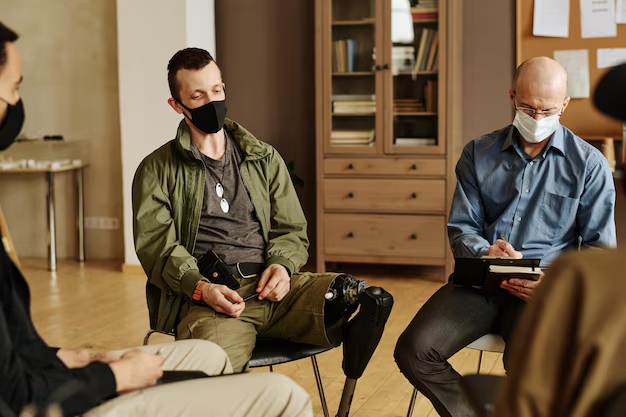Can PTSD Be Overcome? Understanding The Journey To Healing
Imagine a life where your brain serves as a constant playback device, replaying traumatic events from your past in high-definition clarity. For those living with Post-Traumatic Stress Disorder (PTSD), this is an all-too-common reality. PTSD can be a debilitating mental health condition triggered by experiencing or witnessing a traumatic event. But one question looms large for those seeking relief: Can PTSD be cured? In this comprehensive exploration, we’ll dive into what PTSD is, discuss potential pathways toward healing, and examine how individuals can thrive beyond trauma.
Understanding PTSD: More Than Just Flashbacks
PTSD is not merely a "mental rut" or something one can simply "get over." This disorder affects 8 million adults in the U.S. annually, according to some estimates, and its impact is profound.
What Causes PTSD?
PTSD is commonly associated with experiences such as combat exposure, sexual violence, physical assault, and serious accidents. However, it’s crucial to understand that the disorder does not limit itself to these traumatic events alone. Less obvious sources of PTSD might include sudden loss of a loved one, witnessing violence, or the aftermath of natural disasters.
Symptoms of PTSD
PTSD symptoms are varied and often categorized into:
- Intrusive Memories: Unwanted, distressing memories of the traumatic event.
- Avoidance: Steer clear of reminders, people, or places that conjure memories of the event.
- Negative Changes in Thinking and Mood: Feelings of alienation, hopelessness, or negative beliefs about oneself or others.
- Arousal and Reactivity Symptoms: Hyper-vigilance, difficulty sleeping, and irritability.
Each person's experience with PTSD is unique, with symptoms fluctuating over time based on stress levels or new and emerging experiences.
Can PTSD Be Cured?
The straightforward answer is that PTSD may not be "cured" in the traditional sense. However, it can often be managed effectively, allowing individuals to regain control of their lives.
The Role of Treatment
Various treatment options aim to reduce symptoms and improve functioning. Let’s explore some of these approaches:
Cognitive Behavioral Therapy (CBT)
CBT is often considered the gold standard in PTSD treatment. This structured method encompasses several techniques, primarily focusing on changing unhelpful thinking patterns. Within CBT, Prolonged Exposure (PE) therapy encourages individuals to face their fears systematically, reducing anxiety over time.
Eye Movement Desensitization and Reprocessing (EMDR)
This innovative therapy involves structured sessions where patients briefly revisit traumatic memories while focusing on external stimuli, such as the therapist's moving finger. EMDR aims to reprocess traumatic memories to reduce their emotional burden.
Medication
Medication cannot eliminate PTSD but can be instrumental in managing symptoms. Antidepressants, particularly Selective Serotonin Reuptake Inhibitors (SSRIs), are often prescribed to alleviate mood disturbances and anxiety associated with PTSD.
Self-Help and Lifestyle Adjustments
In addition to professional treatment, adopting a healthy lifestyle can play a significant role in coping with PTSD. Here are some strategies:
- Exercise Regularly: Physical activity increases the production of endorphins, improving mood and reducing stress.
- Mindfulness and Relaxation Techniques: Engaging in activities like yoga, meditation, or deep-breathing exercises can calm the mind.
- Healthy Diet and Sleep: Proper nutrition and quality sleep are crucial in stabilizing mood and reducing stress.
- Find Support: Joining support groups can be empowering, as sharing experiences with others who understand provides a sense of belonging and validation.
The Power of Support Systems
Recovery is not a solitary endeavor, and support from friends, family, and community can be transformative. Here's why supportive relationships matter:
Understanding Relationships
Having a strong support system fuels the healing process. Relationships characterized by understanding, patience, and empathy can provide the space for growth and self-discovery.
Professional Support
Trained therapists and counselors offer the expertise and safe environment necessary for individuals to work through their experiences. For those resistant to discussing trauma with loved ones, establishing a professional support network is vital.
Tools for Everyone
- Open Communication: Encourage candid conversations about feelings and experiences.
- Active Listening: Provide attention without judgment or unsolicited advice.
- Celebrating Small Victories: Recognize progress, no matter how small.
Thriving Beyond Trauma
Although the journey through PTSD is challenging, many individuals not only survive but thrive by discovering resilience they had never imagined. Here’s how a few have transformed adversity into an opportunity for growth:
Post-Traumatic Growth
Coined by psychologists in the mid-1990s, Post-Traumatic Growth (PTG) refers to positive life changes resulting from trauma. Many individuals report enhanced personal strength, deeper relational connections, and greater appreciation for life.
Finding Purpose
Traumatic experiences often shift life perspectives, leading to profound personal growth. Some find renewed purpose through volunteering, advocacy, or pursuing new career paths that bring meaning.
Embracing a Future With Hope
PTSD may not have a miraculous "cure," but with various therapeutic options and supportive networks, individuals can reclaim their lives. The path toward healing is highly personal, but no journey is without hope. By understanding available treatment options, harnessing the power of community, and embracing personal change, individuals living with PTSD can forge fruitful futures.
Quick Summary of Key Insights 🌟
- Understanding: PTSD is a complex disorder affecting millions but is manageable through treatment and lifestyle changes.
- Treatment Options: CBT, EMDR, and medication are pivotal in symptom management.
- Self-Help: Incorporate exercise, mindfulness, and a balanced diet for additional support.
- Support Systems: Strong relationships and professional help make a significant difference.
- Post-Traumatic Growth: Adversity can lead to profound personal development and new life perspectives.
Remember, even though PTSD presents formidable challenges, by taking confident steps forward, individuals can construct lives filled with resilience, meaning, and joy. 🌈

